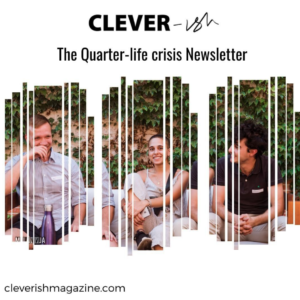Amy Poehler packed her new Netflix film, Wine Country, full of funny moments and absurd situations. One of the most memorable scenes for me came in a parody of a millennial art show, in which Val, played by Paula Pell, drags the friend group along to an art exhibition. The scene begins with hilarious cuts of the women looking unimpressed by the art—Catherine, (Ana Gasteyer), refers to one piece as a “wall of shoeboxes,” while Jenny (Emily Spivey) responds to twin white canvases bearing the messages “I AM ART” and “AM I ART”: “I’ll tell you the answer to that. No, and no, you’re not.”

The camera cuts to images of the other art show attendees, all millennials and dressed to signify, with oversized, thin-rimmed glasses, overalls, extra piercings, and sweatshirts adorned with intentional holes. The gallery attendees sip wine from mason jars while gazing thoughtfully at the art.
The millennial artist, Jade (Maya Erskine) addresses her audience with staggering grandiose. “Art has been my raison d ‘être since literally my first moment of consciousness,” Jade proclaims “I can’t believe I’m following in the footsteps of my heroes—O-Keeffe, Kahlo, Warhol, Basquiat—with my very own show.” She then reveals that she has inexplicably based all of her art on the TV sitcom The Nanny, depicting various images of actress Fran Drescher.
Abby (Amy Poehler), and her gang of middle-aged friends seem to be the only ones conscious of this concept’s absurdity, looking increasingly disgruntled as the millennials ask the artist pretentious and nonsensical questions about her bemusing work.
Finally, the women can’t take it anymore. Naomi (Maya Rudolph) raises her hand. “Yeah, my oldest kid is 15,” she says, “and on the verge of becoming this.” She waves her hands to indicate the pompous millennials. “I just want to know, how do I stop her from becoming an asshole?” This question sparks the women to embark on a tirade against the millennials who, of course, take out their iPhones to film it, before ludicrously misinterpreting the whole thing as part of the show.
While older generations’ resentment of millennials rings painfully familiar, I can’t help but feel this particular mirror might present a reflection worth examining. In my opinion, Poehler (and film writers Spivey and Liz Cackowski) highlight some millennial characteristics that are indeed worthy of criticism.
Millennial Supportiveness can lead to Inauthenticity
Millennials tend to support and encourage one another, remaining hyper-sensitive to others’ feelings at all times. In the art show parody, one millennial says, “I feel like I’m about to take umbrage,” after Naomi calls them assholes. Jade puts a comforting hand on this person’s arm, and a third nearby millennial responds solicitously, “Are you okay?” The first millennial’s hurt feelings present a threat that the whole group feels they must respond to, protecting one another. Later, Jenny quips, “They were born with hurt feelings.”
Remaining in touch with your emotions and behaving considerately of others’ feelings seem, at their surface, like positive attributes. But is it always beneficial to act this way? Should we always strive to be supportive and encouraging, or might candid, genuine reactions sometimes be more valuable? Are we over-careful to protect people’s feelings, when hurt feelings are sometimes necessary for growth?

In this scene, Jenny tells a story about her first poetry reading. “I’ve spent my whole life thinking I suck,” she tells the millennials. “You know what happened at my first poetry reading? I completely bombed. No claps, no snaps, just total silence. Until finally, this one dude way in the back turned to his girlfriend, and he went, ‘Oof.’ But you know what, that was an important ‘oof,’ because it confirmed to me that I’m a complete piece of shit, and that’s what made me the writer I am today. Thank God for that ‘oof.’” She turns to Abby and gestures at Jade. “This girl needs an ‘oof.’”
As Jenny’s story illustrates, criticism if done constructively can be far more useful than offering constant praise, encouragement, and emotional support.
On the other hand, millennials’ ability to support and accept one another has created plenty of positive change. Even in this scene, the depicted millennials include a transgender woman and several others who seem to be gender-ambiguous or sexually fluid. Millennial supportiveness has been invaluable in moving the world towards being more accepting. Unconditional acceptance and encouragement can be unbelievably beneficial.
What’s necessary then is to maintain authenticity, and to avoid performing supportiveness. If we truly appreciate and enjoy an artist’s work, we can certainly praise it. However, if we don’t understand or like something, we shouldn’t pretend to in the name of appearing accepting, open-minded, or supportive.
One of the millennials at the art show says, “I never saw The Nanny, but I don’t want that to stop me from participating in this conversation,” before asking a question about one of the pieces. This need to “participate in a conversation” reveals a performance, the desire to appear interested and informed in place of actual interest or appreciation.
“It’s useful to value your work and believe in your abilities, but how do we extend that freedom to ourselves without becoming pretentious, entitled, and overconfident?”
We often see this performance of open-mindedness or acceptance in social movements. Of course, learning about issues facing minority groups is crucial, whether or not we belong to those minority groups. But when we perform “woke-ness,” we make the situation about us. Look-how-informed-and-empathetic-I-am, rather than Look-at-this-important-issue-that-needs-attention.
Our goal, then, must be to maintain sincere, genuine interactions and reactions, avoiding ego-fueled impulses to behave like the millennial caricatures in this scene.
Millennials can show overconfidence
Jade and her friends come across as incredibly pretentious and self-important. Jade compares herself to some of the most famous artists in the world as if her work deserves the same respect and praise. At one point, Abby says, “I can’t with the confidence on these people.” Val replies, “Wait, so we’re putting them down because they have healthy self-esteem?” But the millennials in the parody exhibit more than healthy self-esteem, they convey unearned security in their talent, wisdom, and importance.
As millennials, how do we draw the line between “healthy self-esteem” and taking ourselves too seriously? It’s useful to value your work and believe in your abilities, but how do we extend that freedom to ourselves without becoming pretentious, entitled, and overconfident?
Next to authenticity, it seems equally important to maintain humility (and not false, self-proclaimed humility like Jade’s character, when, after comparing her show to the work of great artists, she ironically remarks, “I’m humbled”). Confidence is important, but true confidence includes the ability to accept and learn from criticism, not the belief that we will never or should never be criticized.
Furthermore, perhaps a millennial lack of humility feeds the friction between boomers and millennials. In this scene, Abby reveals that she lost her job because “One time I can’t figure out how to get on Snapchat. One time. And everybody saw.” While, like everything else in the scene, this scenario is exaggerated for humor, it does represent a millennial impatience with the older generation while they learn to use new technology.
Perhaps we millennials need to exercise humility in the way we view the older generation. Rather than teasing the older generation for not being able to operate their smartphones, we should admire them for adapting to a world where the way they talk on the phone and conduct business has changed unrecognizably throughout their lifetime. If at times, someone older than us struggles to perform an operation that seems simple, humility should remind us how much knowledge they possess that we still lack.
Maintaining authenticity and humility
While it would be easy to laugh along to Wine Country and then forget it, comedy presents a valuable opportunity to see ourselves and our faults clearly. The millennials at the art show bring our generation’s worst qualities to life. They’re over-sensitive, insincere, self-important, and proud. Laughing at them ought to lead us to recognize those same qualities in ourselves, and fight to overcome them.
Maintaining humility and authenticity presents a lifelong effort, but this scene offers a few specific opportunities we can focus on. When we go to an art show, watch a movie, or listen to new music, we can ask ourselves whether we really enjoy it, or feel that we’re supposed to. Do we really see value in art, or do we just want to support the artist? Are we genuinely enjoying a work, or do we just want to appear sophisticated? We must strive to form our individual opinions about art and give an authentic “oof” when needed.
When we are in the position of the artist, and presenting our work to the world, we can check our expectations. Are we expecting to be praised and appreciated, or anticipating that our work may be criticized? If we are criticized, we must avoid the temptation to reject the criticism, and instead do our best to learn from it. When we are working alongside older generations, we can remind ourselves to value their unique skills, insights, and adaptability. Are we exercising patience and understanding? Do we offer assistance when someone struggles to learn new technology? In these situations, I hope we can practice humility in place of hubris.
Feature Image: Netflix









